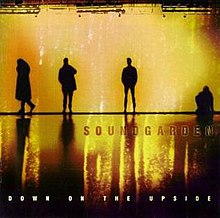Down on the Upside
| Down on the Upside | ||||
|---|---|---|---|---|
 |
||||
| Studio album by Soundgarden | ||||
| Released | May 21, 1996 | |||
| Recorded | November 1995 – February 1996 | |||
| Studio | Studio Litho and Bad Animals Studio, Seattle, Washington, U.S. | |||
| Genre | Grunge, alternative rock | |||
| Length | 65:56 | |||
| Label | A&M | |||
| Producer | Adam Kasper, Soundgarden | |||
| Soundgarden chronology | ||||
|
||||
| Singles from Down on the Upside | ||||
|
||||
| Professional ratings | |
|---|---|
| Review scores | |
| Source | Rating |
| AllMusic | |
| Rolling Stone | |
Down on the Upside is the fifth studio album by the American rock band Soundgarden, released on May 21, 1996 through A&M Records. It is the band's third album with bassist Ben Shepherd. Following a worldwide tour in support of its previous album, Superunknown (1994), Soundgarden commenced work on a new album. Self-produced by the band, the music on the album was notably less heavy than the group's preceding albums and featured the band experimenting with other sounds.
The album topped the New Zealand and Australian charts and debuted at number two on the United States' Billboard 200, selling 200,000 copies in its opening week and spawning the singles "Pretty Noose", "Burden in My Hand", "Blow Up the Outside World", and "Ty Cobb". The band took a slot on the 1996 Lollapalooza tour and afterward supported the album with a worldwide tour. Down on the Upside would end up becoming Soundgarden's final studio album for sixteen years as tensions within the band led to its break-up in April 1997.
The album's recording sessions took place from November 1995 to February 1996 at Studio Litho and Bad Animals Studio in Seattle, Washington. Studio Litho is owned by Pearl Jam guitarist Stone Gossard. The band members made the decision to produce the album themselves. On the choice of not working with a producer, frontman Chris Cornell said that "a fifth guy is too many cooks and convolutes everything. It has to go down too many mental roads, which dilutes it." Drummer Matt Cameron added that while working with Michael Beinhorn in Superunknown had good results, it was "a little more of a struggle than it needed to be", and self-production would make the process go faster.Adam Kasper, who previously had worked with Soundgarden as an assistant engineer on Superunknown, worked with the band as a production collaborator and mixed the album.
...
Wikipedia
